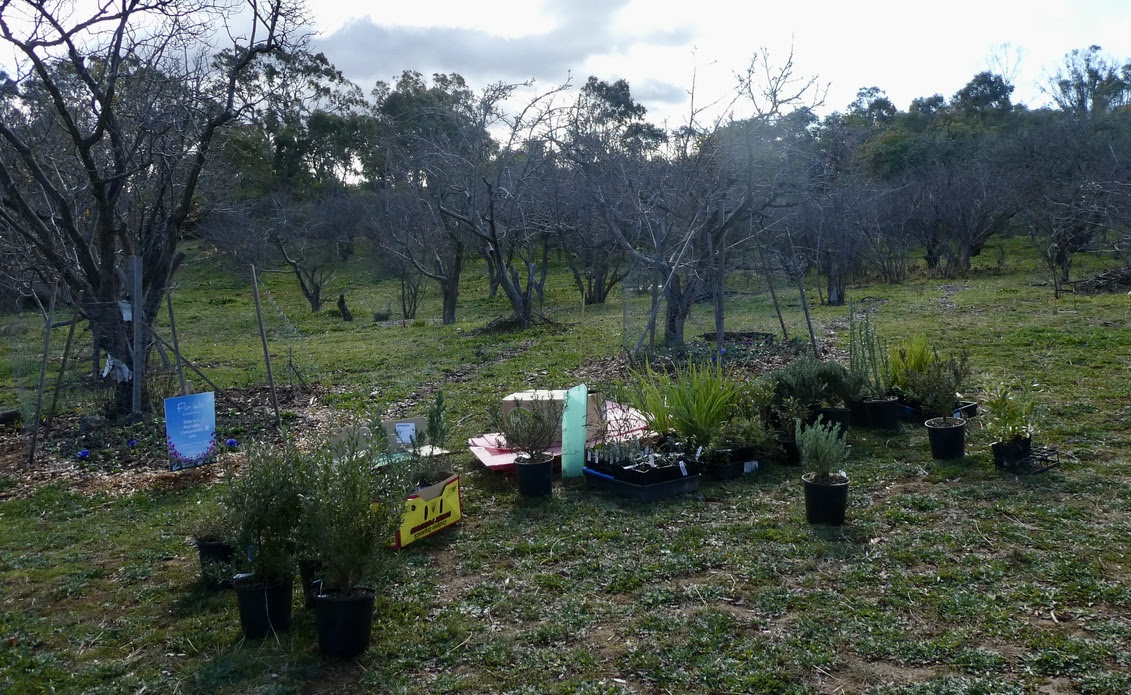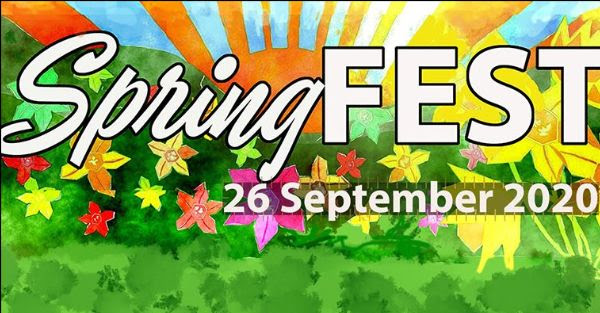ACT For Bees Mid Winter Buzz
July 2, 2020Australian Pollinator Week 8th -15th November 2020- Get involved!
October 28, 2020 Spring has sprung and a number of pollinators are feasting on the plentiful blossom after the winter rains. What a glorious time of year it is in Canberra! Perfect for getting out in the garden and the great outdoors. There’s a wonderful display of Australian native plants in the new gardens at the National Museum of Australia and when we were there last weekend, the honey bees were in overdrive. The Australian National Botanical Gardens is also a great place to see a wide selection of pollinating insects and birds with so much in flower at this time of year. Check out the kangaroo paws in front of the Visitor Centre!
Spring has sprung and a number of pollinators are feasting on the plentiful blossom after the winter rains. What a glorious time of year it is in Canberra! Perfect for getting out in the garden and the great outdoors. There’s a wonderful display of Australian native plants in the new gardens at the National Museum of Australia and when we were there last weekend, the honey bees were in overdrive. The Australian National Botanical Gardens is also a great place to see a wide selection of pollinating insects and birds with so much in flower at this time of year. Check out the kangaroo paws in front of the Visitor Centre!
Floriade is starting to bloom in spots all around Canberra. For a map and program, go to Floriade Reimagined sites around Canberra What’s happening in your suburb?
We’ve produced a planting guide suited to the ACT climate aimed at attracting more pollinators to your garden. Go to Gardening for Bees and start planning your spring garden!

Weston Community Orchard planting for pollinators on the day after it snowed! Thanks to all the families and community who planted > 130 tube stock of native plants. Thanks also to the ACT Government Adopt a Park funding and sponsorship support by Southern ACT Catchment group and support of ACT .
Focus on Climate and Biodiversity:
We support the ACT’s Urban Forest Strategy which envisages a 30% increase in canopy cover by 2045. However, consistent with our renewed focus on the role of cities in maintaining and expanding bio-diversity, we have recently made a further submission to the ACT Government about the need to include mid-story shrubs in its Urban Forest Strategy. This will provide food and habitat for pollinators and other wildlife as well as supporting increased bio-diversity.
The City of Melbourne has focussed on the health of Biodiversity and healthy ecosystems in its Nature in Our City. ‘Insects: The Little Things that Run our City: Insect Biodiversity on the City of Melbourne: an attractive and well documented study.
ACT for Bees raised in our submission to the ACT Urban Forest Strategy the results of the Melbourne study showing that,“ We found that 60% of our insect species live in the mid-storey- the vegetation in between the tree canopy and the ground cover- even though this makes up only a small proportion of vegetation in the City. We are working to increase mid-story habitat to support a larger and more diverse population of insects.” A fascinating account of what insects are doing follows! Well worth considering when planning cityscapes. Planning for the Future of Urban Biodiversity: A Global Review of City Scale Initiatives shows the growing need for comprehensive planning for urban biodiversity.
People are planting tiny urban forests to boost biodiversity and fight climate change.
Australian Centre for Rights of Nature has a Nature Arts Program with a diverse and exciting range of activities on now. The Australian Earth Laws Alliance believes that cultural change is a vital part of building Earth centred law, governance and ethics, and that’s why they have a strong Earth Arts Program and an Earth Arts Collective. In 2020, the Australian Earth Laws Alliance (AELA) will be co-hosting a range of arts activities and events under the theme of “Voices of Nature”. This theme will encourage the exploration of the concepts of ‘voice’, ‘standing’, ‘representation’, and ‘agency’ of the natural world within human governance systems. The theme also promotes AELA’s desire to focus on sound art and acoustic ecology as key mediums for communicating and exploring nature’s voice(s).

Native Bee News:
According to Peter Abbott, one of our local native bee experts who has been recording the amazing range of species of Australian native bees in the Australian National Botanic Gardens , will be on the look out for native bees in mid October. If you’re interested in joining one of his walks, please let us know. We’re very luck to have an all native botanic gardens here that is particularly suited to our local bees. Over 90 species have been spotted so far!
The Sydney Native Bee group is hosting an event on Sunday October 25th at 2pm ‘Bees of Eora’ in collaboration with Costa Georgiadis and Australian Native Bee Association with 12 Local Artists celebrating the diversity of Native Bees in the Sydney region. Exhibited within their natural habitat, an outdoor Art Exhibition in a regional Botanical Garden & native bee sanctuary, on Sydney’s Northern Beaches.
For farmers and Landcare, Sustainable Australia has just published a very good resource “Powerful Pollinators: Encouraging insect pollinators in farm landscapes: Planting guide for North East Victoria, the NSW Murray-Riverina, South West Slopes and parts of Central Tablelands and Central West.
A free webinar Planting of Trees and Shrubs on Sept 17th Join the ANU Fenner School’s Professor Saul Cunningham, Sustainable Farms ecologist Angelina Siegrist & Anna Carrucan from Wheen Bee Foundation to explore the power of pollinators!
Links about Australian Native Bees is on our website also with guides about building bee hotels.

Canberra City Farm, a growing community living in harmony with the environment.
Growing Food in our City: There are a number of initiatives to make Canberra more sustainable with local food growers sprouting in a number of places.
Look out for produce from the Inner North Urban Farm, a network of vegetable garden plots on residential land in Canberra. Their mission is to improve food security and community life for all, while providing meaningful work opportunities for aspiring and emerging growers of all identities. Through the establishment of market gardens they wish to give our urban community the opportunity to choose to eat food grown in their own neighbourhoods. The vegetables grown will be sold directly through a Community supported Agriculture (CSA) weekly vegetable box model where the consumers become members of the farm. This way growers and consumers share the risk of farming by selling the produce ahead of the projected harvest for a fair price. There will be a sliding scale of payment fir the CSA veg boxes. They provide weekly vegetable boxes to support the resilience of our local food system and create job opportunities for young people wanting to farm.
Wonderful to see what is emerging in our local community. Please support them.
ACT for Bees website has a section on Organic Directory for Food, Seed and Plant supplies.
Happy growing and eating!
2020 SpringFEST Workshops:
9am – 9:45am: Going Plastic-Free at Home with Maddie Diamond from SEE-Change.
10am – 11am: Composting 101 with Capital Scraps Composting.
10:15am – 11:15am: The Permaculture Flower with Lizzy Smith from WorkSmith.
11am – 12pm: Worm Farming at Home with Global Worming (1/2).
11:30am – 12:30pm: Basics of Eating Healthy on a Budget & Reducing Food Waste with OzHarvest.
11:30am – 12:30pm: Introduction to Seed Saving with Canberra Seed Savers.
12:45pm – 1:45pm: Creating Bee-Friendly Spaces with ACT for Bees.
1pm – 2pm: Worm Farming at Home with Global Worming (2/2).
Click this link to find all workshop details and tickets: https://www.eventbrite.com.au/
